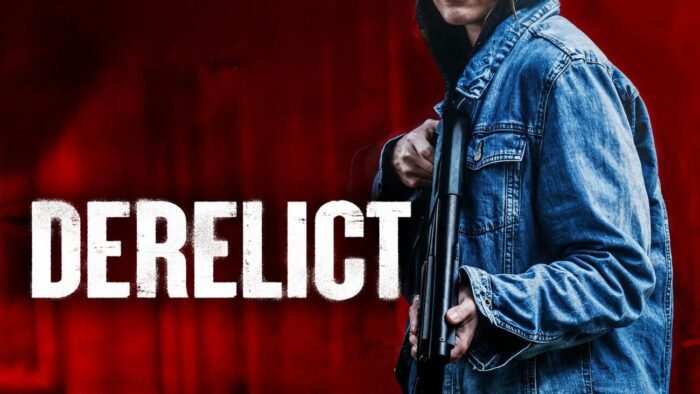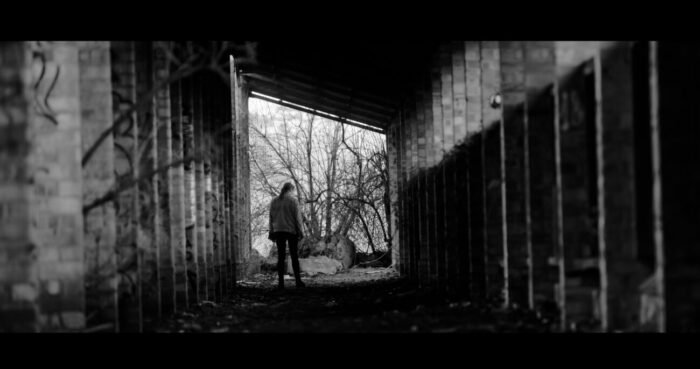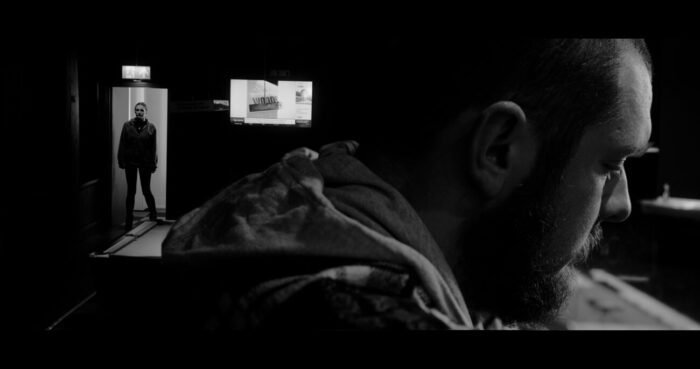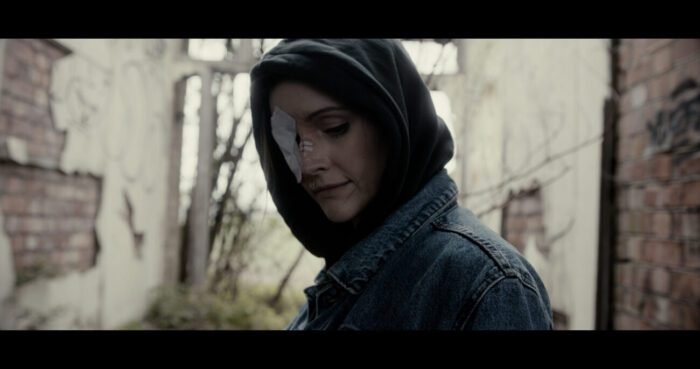A few weeks ago, while covering the film Odyssey for FrightFest, I made mention of an indie cinema subgenre that the UK does exceptionally well–the gritty underground crime thriller. Films like Odyssey and Cara teeter on the edge of drama, but offer unflinchingly brutal aspects that lend them the nightmarish qualities that create an intense horror atmosphere. When Jonathan Zaurin’s Derelict came across my desk this week for review, I didn’t even hesitate. The film has been circulating festivals for about a year now, debuting at FrightFest in 2024 and receiving some major buzz for its director and performers.

Broken up into chapters that alternate between black and white and color, Zaurin begins by showing you a singularly beautiful yet haunting image: the graffiti-covered brick bones of a dilapidated housing structure. Light cascades over the overgrown brush five or so feet above an unobstructed dirt path. Water vapor billows in the light rays, and a light piano brings us into the film’s story. The credits roll as this black-and-white image transitions into color videos of a father wishing his daughter, Abigail (Suzanne Fulton), a happy birthday. Images keep coming, showing Abigail’s happy, vibrant life, until intercut close-up images of zip-tied hands, feet, and dried blood on a body are artfully presented. The montage lingers on the body as it slowly pulls back and away until finally fading to black.
With the three-minute credit sequence, the audience receives a heap of exposition, informing the audience of Abigail and her father’s close connection while abstractly discerning his death from the alternate shots. Derelict’s incredible opening credits sequence efficiently takes hold of the audience, allowing it to set the scene as we’re introduced to a very different version of Abigail in the aftermath.
Sullen and aggrieved, Abigail is a long way from the young woman receiving birthday greetings in the video. Reservedly deflecting her one-night stand’s morning conversation and attempts at generating further interest beyond the hookup, Abigail drags on her cigarette and stares from her window at a man walking outside, carrying his daughter on his shoulders. The gravity of Abigail’s struggles and constant reminders of her father have left her in a defensive position of not wanting to get too close to anyone.

There’s heightened fear and anger whenever Abigail leaves her apartment. As she crosses through a tunnel to get to her car in the parking lot on the other side, a group of youthful hooligans are seen messing around. Both sides take notice of one another, but it’s Abigail whose hands tighten around the steering wheel when she reaches her car. Zaurin poignantly crafts this encapsulation of terror and torment through Abigail, and it becomes intrinsically discernible through Fulton’s performance the subtext of what has transpired.
Abigail’s story splits off shortly after, introducing us to another player in this tale of irrevocable heartache. Black and white gives way to color for Matt’s (Michael Coombes) part in this story. Zaurin acquaints the viewer with Matt through his relationships, first showing him engaged with his Queer best friend James (Joe Nurse), taking edibles, and choosing to avoid the trouble of similar small gangs that Abigail feels trepidation around. Returning home after picking up medicine for his mother, Matt finds his grifter scumbag brother Ewan (Pete Bird) has been released from prison, and has difficulty adjusting to the disruption.
The shades of gray here are interesting, rallying against the demonization of Ewan’s machismo-inflated Queer hatred and light drug use by narratively presenting a greater threat through the guise of accepting family. Ewan assesses a need to take Matt under his wing and set him on the straight and narrow, with an added emphasis on “straight.” He ingratiates Matt into the local gang he’s adamantly circumvented, cruelly demeans James in an effort to remove him from Matt’s life, and eventually coerces him into committing a heinous act.

Derelict does a spectacular job of cultivating branching cycles of violence bred from anger and hatred. Abigail and Matt are very similar in how they’re presented at the start of the film, dodgy of the dangers lurking in their neighborhoods and tied to their familial bonds. Although Derelict shows its main character similarities, it also highlights the differences in how situations unfold, aiming to exhibit perspective. Matt’s initiation into his brother’s inner circle is met with silence, avoiding conflict through conformity. Perhaps this is perceived as cowardice, but given his subservience to Ewan, it may also be a past lesson, one that has been hard-learned. Meanwhile, Abigail, as a woman, faces challenges inherent to her gender and perceived demure behavior.
You can probably guess how these two stories fit together, but if you can’t, I won’t spell it out. IF you’re a fan of dual perspectives and themes of volatility that turn people into media-made monsters and cultural pariahs, then look no further. Derelict is eloquently shot, and its story serves as a morality metaphor ala the “eye for an eye” idiom. The finale of the film is worthy of pages of analysis as Abigail comes face-to-face with her father’s killer, while Matt, either consciously or unconsciously, faces his past and finds a way to break the cycle. While audiences will largely be split over the nature of the Derelict’s ending, their level of satisfaction will be the most revelatory, with those arguing for more violence outing themselves as contributors to their own ongoing cycle they have yet to face.
Derelict will inexorably cause division among audiences, some hoping for a deeper thriller over the heady poignancy served up. The film slowly warps its characters into weathered individuals through the Elem Klimov approach, exposing and embroiling characters to profoundly affecting and transformative levels of violence. There are shades of multiple revenge films lurking within. One scene of Abigail in the car, on her way to get her bloody revenge, rings of The Bride’s intro in Quentin Tarantino’s Kill Bill 2, while the sentiment of an irreversible act causing people to morph into violent actors has a quality of Isaac Ezban’s The Incident about it.

No matter how you end up feeling about it in the end, Derelict is worth a watch for a multitude of reasons. The cinematography is brilliant, the acting is powerful, and the writing by Kat Ellinger, Michael Mackenzie, Todd Rodgers, Sarah Zaurin, and Jonathan Zaurin is constructed perfectly to reflect society, its incivility and intolerance, which lead us down dark paths. The social conversations Derelict can bring about, even along peripheral edges, like father-daughter vs. mother-son bonds, the multiple meanings behind the film’s title, or differences in the financial upbringing of its comparative characters, are examples of the thematic depth that hits you like a freight train, and doesn’t happen often in the underground scene. Jonathan Zaurin shows great promise with Derelict, and I’ll be keeping a close eye on this up-and-coming director’s career.
Derelict is on digital now from Miracle Media and on Blu-ray 22 September from 101 Films.
